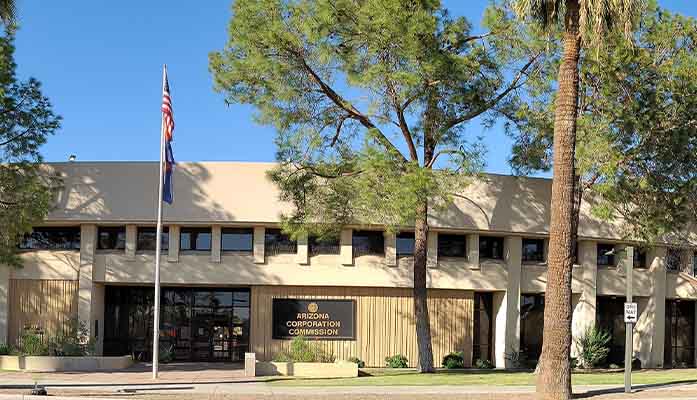
by Daniel Stefanski | Oct 10, 2023 | News
By Daniel Stefanski |
Arizona elected officials stood with Israel after the American ally suffered a shocking and horrific terrorist attack late last week.
After Israel was attacked by Hamas terrorists on Friday night (Arizona time), state politicians offered their thoughts, prayers, and messages of unwavering support for the Middle Eastern democracy.
Governor Katie Hobbs wrote, “I condemn the horrific terrorist attack on Israel by Hamas. Arizona stands with the people of Israel and supports their right to self defense. My heart breaks for the families of those who have been killed, injured or captured.”
Attorney General Kris Mayes stated, “Deeply shocked and heartbroken by today’s terrible Hamas terrorist attacks in Israel. My heart goes out to the families mourning their lost loved ones. Arizona stands resolutely in support of Israel.”
Secretary of State Adrian Fontes added, “This has been a tough day for the world. I unequivocally condemn today’s terrorist attacks in Israel and am thinking of the victims and their loved ones. Every nation should have the right to defend itself. Democracy must be protected wherever it is in jeopardy.”
Treasurer Kimberly Yee also weighed in, saying, “I stand with Israel. The United States has enjoyed a longtime friendship and allied relationship with Israel, a shining light of democracy in the Middle East. As a former State Senate Majority Leader and now as Arizona Treasurer, I have fought against BDS efforts to boycott and harm Israel. Please join me in praying for protection over the people of Israel against these evil Hamas terrorist attacks. May God bless the United States and Israel.”
Many members of Arizona’s Legislature also shared their solidarity with Israel over the weekend.
Senate President Warren Petersen spoke for his Republican conference, stating, “Arizona Senate Republicans stand in support of Israel, one of our nation’s most important allies. We strongly condemn the horrific violence happening against innocent Israeli civilians and Americans. We send prayers for strength, courage and comfort as the Israeli people battle against pure evil.”
Representative Alma Hernandez wrote, “While I don’t post during Shabbat I must break that today. Israel is at war and my heart is breaking for what is happening and unfolding there. Innocent Israelis murdered, walking on the streets, elderly being murdered while waiting at bus stops, women and children being kidnapped, raped and murdered on video. All while Palestinian terrorist are celebrating on the streets. I can’t believe this is happening today. My heart is shattered.”
Arizona Senate Pro Tempore, T.J. Shope, expressed his prayers for the American ally.
Representative Consuelo Hernandez said, “Praying for the people of Israel who were infiltrated by Hamas terrorist. So many more Israelis will be killed for the simple reason of being Jewish and existing. You are not alone. The world is watching.”
Representative Jacqueline Parker praised Israeli leadership and response to the attacks, saying, “At least there’s one righteous super power left in the world with competent leadership. I pray for Israel’s safety & swift victory.”
Representative Seth Blattman added, “This is a horrifying surprise attack on the people of Israel. I stand with Israel as it defends itself against Hamas in this ongoing assault.”
Other municipal and county officials also issued their own statements in reaction to the events from the weekend.
Phoenix Mayor Kate Gallego posted, “I’m proud to stand with Israel and condemn Hamas’s attacks on innocent people in the strongest terms. Here in Phoenix, our police are stepping up patrols near synagogues – and our hearts are with our many friends throughout Israel.”
Representative Alexander Kolodin recognized the increased security provided by Phoenix law enforcement, stating, “Grateful to the Phoenix Police for this extra degree of vigilance. We American Jews are tremendously luck to live in a country where officers of every faith are willing to risk their lives to protect our ability to worship freely.”
Maricopa County Attorney Rachel Mitchell also shared her prayers for Israel.
Peoria Mayor Jason Beck told AZ Free News that “Israel is a home away from home for me and my family. It has a sacred history and is one of the few places in the region that respects the personal beliefs of their citizens. I’m both saddened and angry at what these acts of terrorism have done to the people of Israel. I am taking action by sending body armor to Israel for the protection of the brave soldiers who will defend their homeland and our Western values. The Biden administration should be ashamed of their recent actions that opened up funding to Iran. Iran is who has openly trained and funded Hamas and other affiliates that don’t recognize Israel’s right to exist. They seek to wipe Israel off the face of the earth. I stand with the men and women of Israel in this fight and pray that God will protect their homeland.”
Daniel Stefanski is a reporter for AZ Free News. You can send him news tips using this link.

by Daniel Stefanski | Oct 10, 2023 | News
By Daniel Stefanski |
Concerned Arizonans continue to take action to defend the future of women’s sports in their state.
Last month, the Arizona Women of Action filed an amicus brief at the U.S. Court of Appeals for the Ninth Circuit in Doe v. Horne. This case concerns a challenge to the Arizona’s Save Women’s Sports Act, which was passed by the state legislature in 2022 and signed into law by former Governor Doug Ducey.
Kim Miller, the Founder and Director of Arizona Women of Action, said, “On behalf of Arizona parents and their student-athlete daughters, Arizona Women of Action strongly supports the Save Women’s Sports Act to ensure the safety and level playing field of female athletics. The facts and statistics don’t lie – the differences between males and females are real, even before puberty, and AZWOA stands with Superintendent Tom Horne and the Arizona Legislators to protect women’s sports here in Arizona.”
In their brief, the Arizona Women of Action make three arguments for the west coast appeals court to consider. First, that “the Arizona Legislature’s findings were thorough and based on sound evidence.” Second, that “the Arizona Legislature enacted the Save Women’s Sports Act for a legitimate purpose and to address a real problem.” And finally, that “the District Court improperly ignored the harm to biological females when biological males participate in girls’ sports.”
Earlier this summer, District Court Judge Jennifer Zipps granted a preliminary injunction against SB 1165, the Save Women’s Sports Act, which blocked the law from going into effect. At that time, Arizona’s Republican Superintendent of Public Instruction, Tom Horne, the defendant in the case, promised to appeal the ruling, saying, “This will ultimately be decided by the United States Supreme Court, and they will rule in our favor. The Plaintiffs in this case claimed that this only involves pre-pubescent boys, but we presented peer-reviewed studies that show pre-pubescent boys have an advantage over girls in sports. The only expert presented by the Plaintiffs was a medical doctor who makes his money doing sex transition treatments on children and who has exactly zero peer-reviewed studies to support his opinion.”
Joining Horne as defendants in the case are Arizona Senate President Warren Petersen and House Speaker Ben Toma, who have actively filed motions throughout the proceedings at both the District and Appeals Court levels. In a recent motion to the Ninth Circuit, the Republican legislative leaders wrote, “Under the district court’s preliminary injunction order, ‘the [Save Women’s Sports] Act shall not prevent Plaintiffs from participating in girls’ sports’ and ‘Plaintiffs shall be allowed to play girls’ sports at their respective schools.’ Any success by Plaintiffs in try-outs and meets will displace biological girls from making a team, getting playing time, and succeeding in final results. Biological girls will be irreparably harmed if they are displaced by, forced to compete against, or risk injury from Plaintiffs.”
According to Arizona Women of Action, “the district court still has not ruled on (their) Motion to Intervene,” which was filed in June. The amicus brief before the Ninth Circuit lists three parent representatives – Anna Van Hoek, Lisa Fink, and Amber Zenczak. All three ladies have daughters who play sports, which, per the legal filing, means that they are “directly affected by the presence of biological males on girls’ sports teams.” Fink and her daughter shared their belief “that a biological male on their team would have an unfair advantage to be able to get a starting position on the team and achieve similar benefits and advantages. This would create an environment on the team of disunity and corrosive rivalry. Furthermore, if biological males were allowed to play on competing teams, those teams would have an unfair advantage. It would create a strong sense that the competition was not on a level playing field.”
The group’s bio outlines its purpose, which “is to revive the American dream of strong families, safe cities, and thriving kids, with a focus on citizen action in the areas of education, community, life, anti-trafficking and prayer.”
Daniel Stefanski is a reporter for AZ Free News. You can send him news tips using this link.

by Daniel Stefanski | Oct 9, 2023 | Economy, News
By Daniel Stefanski |
A state representative is expressing disgust with the rising gas prices in Arizona.
Last week, Arizona State Representative Teresa Martinez posted a picture of the price of gas at a pump, showing the cost to be $4.899 per gallon. The total cost for whomever was filling up a tank (almost 13 gallons) was just under $64.00.
Martinez posted, “This is not Build Back Better! It’s more like BAD, BUSTED AND BROKE!”
The Republican lawmaker isn’t alone with her observation or feelings about the increasing costs at the pump. Heritage Action shared that gas prices have skyrocketed 59% since President Joe Biden took office on January 20, 2021.
And the financial sticker shock hasn’t just hit conservative politicians or organizations – let alone everyday Americans. Jimmy Butler, a professional basketball superstar, filmed a short video, where he reacts to the final cost of filling up his vehicle. Butler exclaimed, “This is highway…robbery! This is crazy. I’m going electric.”
As of October 5, AAA reports that the national average for gas is $3.768, but the Arizona average is almost a dollar more expensive at $4.594. One year ago, the average price per gallon of regular gas in Arizona was $4.512, meaning that while costs have fluctuated throughout the year, consumers haven’t received many – if any – breaks when filling up their tanks. According to AAA, the highest recorded average price of regular gasoline in the Grand Canyon State was $5.388 on June 17, 2022.
Daniel Stefanski is a reporter for AZ Free News. You can send him news tips using this link.

by Daniel Stefanski | Oct 9, 2023 | News
By Daniel Stefanski |
The Arizona Corporation Commission is adding a seasoned professional to its staffing ranks.
This week, the Arizona Corporation Commission (ACC) announced that it had appointed Ed Block to be the new Chief Information Officer. The release from the ACC introduced its new hire as someone “with over 25 years of experience in portfolio, program and project management,” bringing “a wealth of knowledge and a proven track record in delivering complex systems and software solutions.”
According to the ACC, Block “was the first to get a state agency on the cloud, with extensive experience in various sectors including Education, Learning Management Systems, Banking/Fraud-detection, and Cloud and Infrastructure management. As a certified Scrum Master, he has been at the forefront of utilizing Agile methodologies along with Hybrid and Waterfall approaches since 2004. His collaborative leadership style focuses on asking the right questions and gathering the right data to drive both strategic and tactical directions for progressive solutions.”
The ACC’s release shared information about what Block would be doing with his new job, starting with overseeing “the development and maintenance of software solutions, network systems availability and security, data storage and retention, IT hardware and software purchases, and the administration of the IT budget.”
In his previous role at the Arizona Department of Education, Block accomplished the following:
- Saved over $500K through early completion and resource optimization
- Migrated and modernized extensive data storage to Microsoft Azure cloud platform
- Reduced monthly Azure costs by $40K
- Implemented Microsoft Office 365 and Microsoft Teams for 685 staff
- Improved system recovery times by 70%
Block’s bio includes being an avid DIY enthusiast and a proud grandfather, working on a pool pump house, and planning to restore his 1967 Alfa Romeo Duetto.
The ACC highlighted Block’s belief “in empowering people” as well as “a leadership approach that fosters innovation and team collaboration,” adding that his “multifaceted experience and commitment to innovation make him an invaluable addition to the Arizona Corporation Commission.”
Daniel Stefanski is a reporter for AZ Free News. You can send him news tips using this link.

by Corinne Murdock | Oct 8, 2023 | Education, News
By Corinne Murdock |
Phoenix College, the flagship institution for Maricopa County Community College District (MCCCD), hosted a drag queen story hour for all ages on Tuesday featuring banned books.
Drag Story Hour AZ held the event. The banned books read were “My Princess Boy” by Cheryl Kilodavis, which advocates for the normalization of gender nonconformity; “Neither” by Airlie Anderson, which advocates for the normalization of nonbinary and transgender children; “Prince & Knight” by Daniel Haack, which advocates for the normalization of same-sex relationships; and “Red: A Crayon’s Story” by Michael Hall, which advocates for LGBTQ+ normalization.
In an email, Phoenix College described the story hour as a “Freedom Read” inclusive opportunity to build community. The college hosted the story hour in celebration of Banned Books Week.
“Drag story hours offer inclusive environments for community building and informal learning through a familiar (and fun!) literacy activity,” read the email. “Beyond asking that you encourage our students (and their families!) to attend the event, we warmly welcome your participation.”
A community activist and parent opposed to drag queen story hours for children posted that he attempted to obtain tickets for the event, but was restricted from doing so.
Drag Story Hour AZ also lists other banned books on its Bookshop page. In addition to the books read on Tuesday, the organization recommended the following LGBTQ+ advocacy books for children and their families: “Worm Loves Worm,” “10,000 Dresses,” “Antonio’s Card,” “I Am Jazz,” “When Aidan Became a Brother,” “The Boy Who Cried Fabulous,” “Pink Is For Boys,” “This Day in June,” “And Tango Makes Three,” “Pride: The Story of Harvey Milk and the Rainbow Flag,” “Last Week Tonight With John Oliver Presents: A Day in the Life of Marlon Bundo,” “Queer, 2nd Edition: The Ultimate LGBTQ Guide for Teens,” “Queer, There, and Everywhere: 23 People Who Changed the World,” “Real Queer America: LGBT Stories From Red States,” “A Queer History of the United States,” “Parenting Beyond Pink & Blue: How to Raise Your Kids Free of Gender Stereotypes,” “The Gender Creative Child: Pathways For Nurturing and Supporting Children Who Live Outside Gender Boxes,” “Helping Your Transgender Teen: A Guide For Parents,” “This Is a Book For Parents of Gay Kids: A Question & Answer Guide to Everyday Life,” and “Sissy: A Coming-Of-Gender Story.”
The organization’s founder and president, David Boyles, is an English professor at Arizona State University (ASU). As reported previously, Boyles has been featured in several events promoting drag entertainment through local libraries and the Arizona Humanities.
Boyles has held that LGBTQ+ storytelling to minors remains important because it “counter[s] the erasure of queer stories,” and advocates for their attendance at drag shows as well.
Corinne Murdock is a reporter for AZ Free News. Follow her latest on Twitter, or email tips to corinne@azfreenews.com.

by Corinne Murdock | Oct 8, 2023 | News
By Corinne Murdock |
Gov. Katie Hobbs’ ex-press secretary, Josselyn Berry, ousted for tweeting a death threat to “transphobes” hours after the Nashville school shooting, has returned to the dark money organization she worked for previously.
After laying low for several months and privatizing her social accounts, Berry reactivated her LinkedIn and publicly announced her hire by Progress Arizona. She began working with the organization in June.
“After a much-needed sabbatical I’m thrilled to announce I’ve returned home to my Progress Now family as their Senior Director of Campaigns,” said Berry. “I’ll be working with our battleground states to help them run winning programs for the 2024 election cycle.”
Although Berry has reactivated her LinkedIn account, her X page (formerly known as Twitter) remains private. At some point after inciting controversy and making her X page private, Berry updated her profile header image from a picture of Hobbs to the phrase “Trans Rights Are Human Rights.”
Those who reacted positively to Berry’s characterization of her departure from the Ninth Floor included Hobbs’ policy advisor, Molly Murphy; Hobbs’ deputy chief of staff, Will Gaona; Arizona House communications director, Robbie Sherwood; Arizona Senate Democratic Caucus communications director Calli Jones; Arizona House Democratic Caucus senior policy advisor Vicente Reyna; and Phoenix Vice Mayor Yassamin Ansari’s communications director, Emily O’Neil.
Berry resigned within days after issuing a general death threat to those opposed to transgender ideology. The morning after the Covenant School shooting, Berry posted a gif of a woman holding guns in each hand with the caption “Us when we see transphobes.”
Less than 24 hours before, a woman who identified as a transgender man shot and killed three elementary school-aged children and three teachers at the Covenant School in Nashville, Tennessee.
Prior to her communications gigs with Hobbs, the Arizona Democratic Party, and the Arizona Senate Democrats, Berry served as the Progress Arizona executive director and chairman.
The dark money nonprofit has received funding from One Arizona, which in turn received funding from the dark money behemoth Arabella Advisors’ five nonprofit arms.
The nonprofit has also received funding from George Soros directly, such as through his Democracy PAC, and indirectly, such as through the Future Now Fund (aka PAC For America’s Future).
The nonprofit then turns around and issues funding to a number of progressive nonprofits including the Arizona Advocacy Network, CASE, Civic Engagement Beyond, League of Women Voters AZ, LUCHA, Our Voice Our Vote, Poder Latinx, and Rural Arizona Action.
Berry also previously worked as the program manager for Arizona Wins and communications coordinator for the Arizona Advocacy Network, two key organizations within the state’s leftist dark money network.
Corinne Murdock is a reporter for AZ Free News. Follow her latest on Twitter, or email tips to corinne@azfreenews.com.






